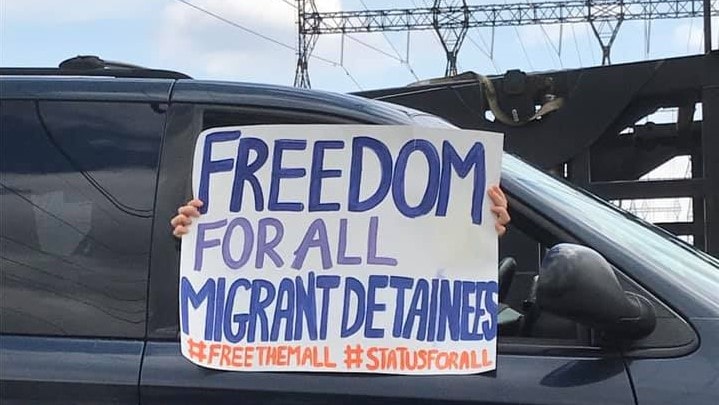
KJIPUKTUK (Halifax) – Pressure has been mounting throughout the country for the release of prisoners and migrant detainees. While federal officials have delayed action, COVID-19 infections continue to spread like wildfire throughout Canada’s prison system.
There are currently 14,000 inmates in federal custody, along with 150 individuals in immigrant detention. Already, at least 387 prisoners and staff have tested positive for COVID-19 in Canada’s prisons and immigrant detention centres. The overwhelming majority of cases are in federal institutions, where only 564 COVID-19 tests have been administered to date.
On Sunday April 19, migrant and prison justice advocates from across the country spoke at a virtual press conference about conditions on the inside during the pandemic and demanded immediate action by the federal government. While there were attempts to derail the event through “zoom-bombing,” it ultimately continued as planned.
A former migrant detainee using the pseudonym Abdoul spoke about conditions at the Laval Immigration Holding Centre (IHC) in Quebec, where one guard has tested positive for COVID-19:
“Detained migrants face extreme vulnerability due to lack of ventilation in the common space and in their rooms, the proximity between security guards and detainees, the lack of protective equipment for detainees and also the impossibility of detecting asymptomatic carriers of COVID-19 who would be vectors for the illness.”
Abdoul noted that prisoners at the Central Nova Scotia Correctional Facility at Burnside, who expressed their solidarity with migrant detainees like him during the 8-day hunger strike at the Laval IHC “share the same fears, uncertainties and vulnerabilities” and called for their release.
On Monday, Nova Scotia officials confirmed that a prisoner at the Burnside jail had tested positive for COVID-19.

Souheil Benslimane, Lead Coordinator for the Jail Accountability & Information Line and former federal prisoner, shared a troubling account from Ottawa: “Prisoners are not being provided with masks or any disinfectant or wipes [or even] enough hygienic paper or soap… Folks who need assistance to take showers from a personal support worker, they haven’t taken showers in weeks.”
Referring to the Ottawa-Carleton Detention Centre, Benslimane noted: “I hear from prisoners that guards are not respecting protocols to tackle COVID [inside]. Guards are not wearing gloves and masks, even though their union fought for them to get those masks and gloves.”
Both Abdoul and Benslimane pointed to inadequate screening processes for people entering the incarcerated population. Benslimane emphasized that the solution is not to isolate people when they arrive in jail, but rather to stop the flow of people into these institutions.
Addressing the horrible mass shooting in Nova Scotia this weekend, poet, journalist, scholar and community activist El Jones had this to say:
“Even as we feel fear, even as we feel out of control and as we have responses that make us reach towards authority and power, and say ‘I think we need police now,’ ‘Oh, but I want to be safe,’ that are very normal human responses, [let’s] remind ourselves again and again that human rights are not replaceable… that policing and punishment do not solve pandemics and that there is no death penalty for those who are incarcerated.”
Canada’s chief public health officer, Dr Theresa Tam, has referred to correctional facilities as a high-risk setting, noting that an outbreak “[could] result in devastating outcomes for persons with underlying medical conditions.”
At a federal prison in Mission, British Columbia, there are 70 reported cases of COVID-19 and at least one inmate has died from complications related to the illness.
While some action has been taken provincially to depopulate prisons, only one federal inmate has received a conditional release citing health concerns, which make him vulnerable to COVID-19.
According to Solidarity Across Borders, the Canada Border Services Agency has been “slowly releasing migrant detainees on a case-by-case basis through individual detention review hearings.”
Minister of Public Safety Bill Blair made headlines when he suggested at a press conference on Monday that hundreds of federal inmates had been released in response to COVID-19. According to Justin Piché, an associate professor of criminology at the University of Ottawa: “His office later confirmed the 600 are people who were already scheduled for release. The Minister’s citing of the 600 releases when facing questions about the federal prison and parole system’s response to COVID-19 is thus very misleading, it’s a red herring, it’s deceptive.”
Meanwhile, there are ongoing concerns about the reliance of federal facilities on solitary confinement and lockdowns for medical isolation purposes.

After the press conference, supporters drove to prisons and detention centres in British Columbia, Ontario, and Quebec as part of the Free Them All caravan. Maintaining social distance, they honked their horns and held signs in solidarity with imprisoned people, calling for their release, as well as permanent residence status for all.
With a special thanks to our generous donors who make publication of the Nova Scotia Advocate possible.
Subscribe to the Nova Scotia Advocate weekly digest and never miss an article again. It’s free!



